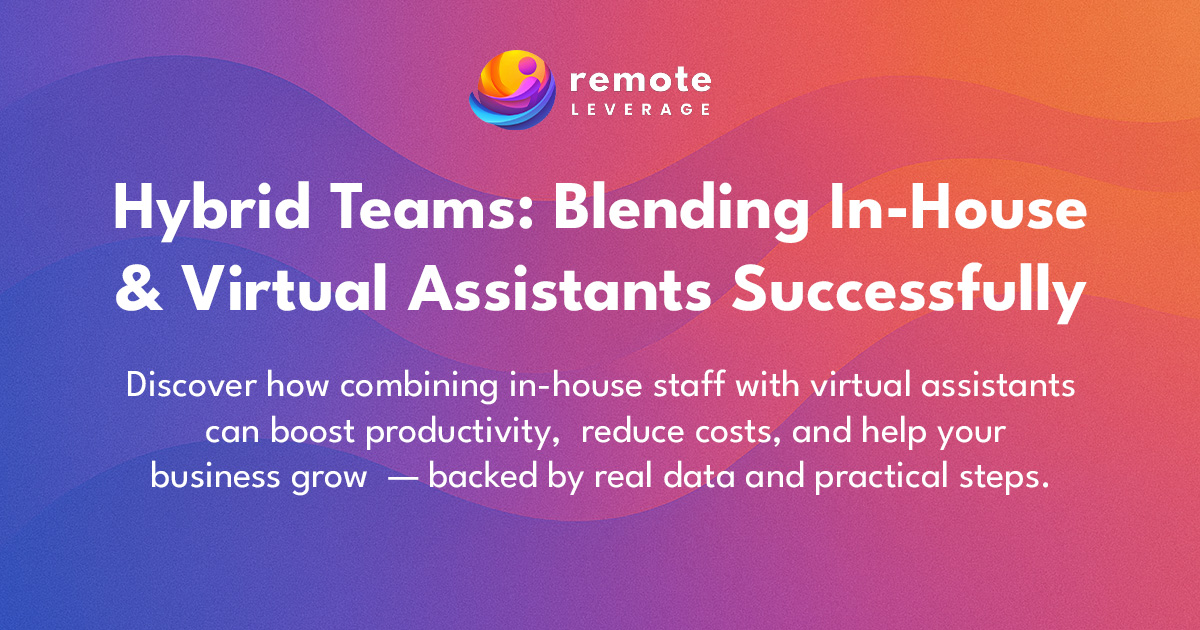
Companies of all sizes are rethinking how they build their teams. Traditional hiring models are expensive, slow, and not always suited for fast-moving businesses.
Enter the hybrid team model — a flexible combination of in-house employees and virtual assistants (VAs). This approach gives businesses more agility, better cost control, and a leaner path to growth.
According to a 2023 survey from Owl Labs, 74% of U.S. companies now operate with a hybrid or remote workforce. That trend is accelerating, especially among startups and service businesses.
A hybrid team blends:
This structure helps companies stay agile, responsive, and cost-effective — without sacrificing quality.
Virtual assistants are ideal for task-driven roles. They handle the operational weight that would otherwise slow down your core team.
Benefits of Including VAs:
According to the U.S. Bureau of Labor Statistics, an in-house administrative assistant costs around $44,000 per year before benefits. A skilled VA from Latin America typically costs $800–$1,500 per month — and many bring equivalent or better experience.
Not every task needs to be done in-house. VAs are perfect for roles that are process-driven, recurring, and time-consuming.
Top Tasks to Delegate:
| Category | Tasks VAs Can Own |
| Admin | Inbox management, scheduling, calendar upkeep |
| Customer Support | Help desk tickets, client follow-ups, FAQs |
| Marketing | Social media posting, content formatting |
| Sales Support | Lead research, email follow-ups, CRM updates |
| Finance | Invoicing, payroll prep, expense tracking |
| Operations | Data entry, SOP maintenance, order fulfillment |
According to McKinsey, 41% of workers spend over 25% of their time on tasks that could be delegated or automated. A hybrid model helps solve that problem without breaking the bank.
1. Assign Clear Responsibilities
Each team member — in-house or virtual — should know exactly what they own. This helps avoid confusion, missed tasks, and bottlenecks.
2. Use the Right Tools
Great teams rely on great systems:
3. Build a Culture of Inclusion
Your VA might be remote, but they’re still part of your team. Include them in standups, updates, and team wins. The more connected they feel, the more engaged they’ll be.
4. Document Key Processes
Even a simple SOP can save hours in training. Use checklists, screen recordings, or templates to make it easier to onboard new team members and scale faster.
5. Focus on Output, Not Time
Most virtual assistants are task-based. Measure their performance by what gets done — not by how many hours they log. This keeps your team focused on results.
The right VA can help you stay on top of your store’s performance by tracking key data like:
They can prepare weekly reports or summaries to help you make better decisions. Instead of guessing what’s working, you’ll know for sure.
A growing digital agency had three in-house team members:
To scale without overhiring, they added:
Results:
Their hybrid team helped them grow revenue without growing overhead.
A hybrid team lets you stay small, focused, and agile — while still expanding your output.
Your in-house employees stay focused on leadership and strategic work. Your virtual assistants handle the tasks that can be done remotely with precision and speed.
This structure works especially well for:
Q: Do I need to hire a full-time virtual assistant?
Not at all. Many companies start with 20 hours per week. This gives you consistent support without the cost of a full-time hire.
Q: Will my in-house team work well with a remote assistant?
Yes, as long as roles are clearly defined. Use shared tools, communicate regularly, and set clear expectations. It helps to treat your VA like a team member — not just a contractor.
Q: Are Remote Leverage VAs trained or experienced?
Our VAs are college-educated, fluent in English, and skilled in tools like CRMs, Google Workspace, and more. They are professionals — not entry-level freelancers — and they integrate quickly.
Q: What time zones do they work in?
Our virtual assistants are based in Latin America, which aligns well with U.S. business hours. This makes real-time collaboration easy.
Q: Is it safe to give a VA access to tools and data?
Yes. Use secure password sharing tools like LastPass and assign limited roles in platforms. Many businesses run remote teams securely every day.
Q: What happens after Remote Leverage matches me with a VA?
You pay a one-time matching fee, then work directly with your assistant. You handle ongoing communication and payment — and there are no recurring agency fees.
Remote Leverage helps U.S.-based businesses hire skilled virtual assistants from Latin America — without agency middlemen or monthly markups.
✅ Hire from Latin America
✅ Fluent in English and dependable
✅ Skilled in admin, marketing, customer support, finance, and more
✅ Plug-and-play assistants who integrate fast
✅ One-time fee — no recurring charges
👉 Book a call and get matched today
Grow your business without growing your overhead.